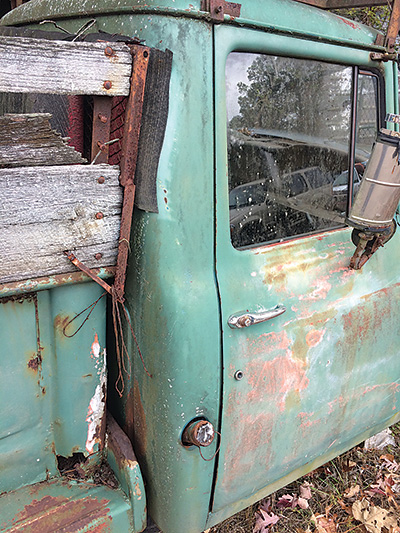
by Tom Chillemi –
“One person’s junk is another person’s treasure,” Earnest Gresham of Locust Hill told the Middlesex Board of Supervisors during a public hearing on a proposed inoperable vehicle ordinance on November 6 at the Historic Courthouse in Saluda.
Board chair Chip Holt told the audience the proposed inoperable vehicle ordinance was initiated by the Middlesex Board of Supervisors following complaints by citizens. “This is your board of supervisors being responsive to citizens’ complaints,” said Holt.
At the meeting, Middlesex’s codes compliance officer Mark Longest read a proposed resolution indicating that inoperable vehicles are a safety and health issue and negatively affect property values.
The definitions listed in the ordinance were adapted from the Virginia Code, said Longest. Overall the draft proposed “is pretty lenient on the numbers considering other surrounding counties have restrictions of one to none allowed (out in the open) on their property,” said Longest.
Enforcement would be based on a written complaint, said Longest. “I will not be driving around looking for vehicles,” he said.
Vehicles that are on a large tract of land such as 10 acres and not visible from the roadway would not be governed by this ordinance.
Public hearing
Monica Sanders of Topping said her husband is in the process of rebuilding a vehicle. Sanders said she took exception to the section that said the property owner can only have five inoperable vehicles. “If you can’t see them, there should be no issue.”
Betty Lucas of Hartfield indicated the ordinance would infringe on “property rights.”
Doris Rogers said her family has hauling trailers at Harmony Village. “I don’t think it’s a fire hazard and does not have rodents. We object to this (ordinance). I resent you telling me what we can and cannot do with our property that we pay taxes on.”
James Yarrington of Harmony Village said he works and buys a lot of junk cars. He disagreed that inoperable vehicles are a fire hazard. “I’ve never heard of a fire department in Middlesex County having trouble getting around automobiles, or kids getting in cars and getting hurt. I think everybody should have a right to keep what they want on their properties and as long as it’s not endangering anybody or hurting anyone, it should be legal for us to have [them].”
Robert Roberts of Topping said he is restoring a vehicle and he is opposed to the ordinance.
A Locust Hill resident spoke in favor of the proposed ordinance, noting that people have cars in their yards “up on cinder blocks.”
Gresham said he has cars on his property that he uses for parts to restore old cars. “We should have a right to have vehicles on the land,” said Gresham. “One person’s junk is another person’s treasure.”
“Work something out”
Jamaica District Supervisor Wayne Jessie Jr. said that if someone has a problem with a neighbor’s inoperable vehicle, they should talk to them and “work something out.”
Old cars in rural areas are not unusual, especially for a business, and limiting the number is not right, said Jessie who said he was not in favor of the ordinance. Jessie, who has a roofing business, said this ordinance will require him to put up some fencing to screen his vehicles. “Be realistic and look at all the options,” he said.
Tourism
Board chair Chip Holt said he is an advocate for property rights. “For the most part our county is waterfront community and we depend on tourists to come in and spend their money. We do need to think, since that is our business and that’s our industry, about what is pleasing and what these people would like to see when they come to their tourist destination.”
Holt said he was not speaking for or against the ordinance that he noted deals with the screening of inoperable vehicles. “I would like everybody here just to keep in mind where a whole lot of county revenue comes from and whether or not this ordinance would be good for enhancing a tourist’s experience,” he said.
Jessie argued that tourists seeing junk cars would not affect their visit to the county.
Input
Harmony Village representative Kathy Swinehart said her input has been from those who live on smaller lots where neighbors are closer together. “They don’t have as much flexibility in screening unless the owner of the car screens it,” she said.
The original proposed ordinance did not prohibit keeping inoperable vehicles for parts as long as they are less than five vehicles and they are screened from the road, noted Swinehart. “It’s only complaint driven. I don’t see it as being a huge burden.”
Swinehart said there was a situation where a landlord was putting inoperable vehicles on a property that was rented to a tenant.
Swinehart said this ordinance is a way to enhance the community and “is a good compromise.”
“Generous”
Holt noted that the Middlesex ordinance is more “generous” in terms of the number of cars out in the open than surrounding counties.
Under Section D of the ordinance, scrap and automobile dealers with a license are exempt from the ordinance, including farming, said Longest. He noted the zoning ordinance allows junk yards in Low Density Rural (LDR) zones with a Special Exception granted by the board of supervisors.
Saluda District Supervisor Pete Mansfield said, “All of us are required to keep our property somewhat good looking. I don’t think this ordinance is trying to put an undo burden on people. We all do have a responsibility to make our county look good.”
Screening
If vehicles are screened, “I don’t think it is a problem,” said Holt, indicating that limiting the number of vehicles was the objection of some of those in opposition.
After some discussion, the board raised the number of inoperable vehicles stored out of doors from 5 to 10 if they are screened from view.
Ordinance
Under the ordinance, methods of shielding or screening include an opaque masonry wall, a hedge or dense evergreen landscape planting, an opaque, treated-wooden fence of stockade, board and batten, panel or similar type design and/or an opaque, defect-free car cover especially designed and manufactured to be a car cover.
All inoperable vehicles in all zoning districts must be screened from view or in a fully enclosed building. The maximum number of inoperable vehicles allowed outside is 10 and they must be screened. Only 10 vehicles can be stored outside, vehicles number 11 and up must be in a fully enclosed building.
Voting in favor of the inoperable vehicle ordinance were Holt, Swinehart and Mansfield. Voting against was Jessie. Supervisor John Koontz was absent.



